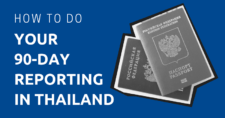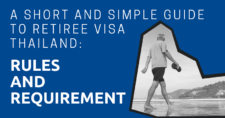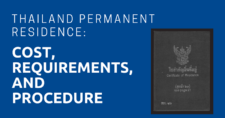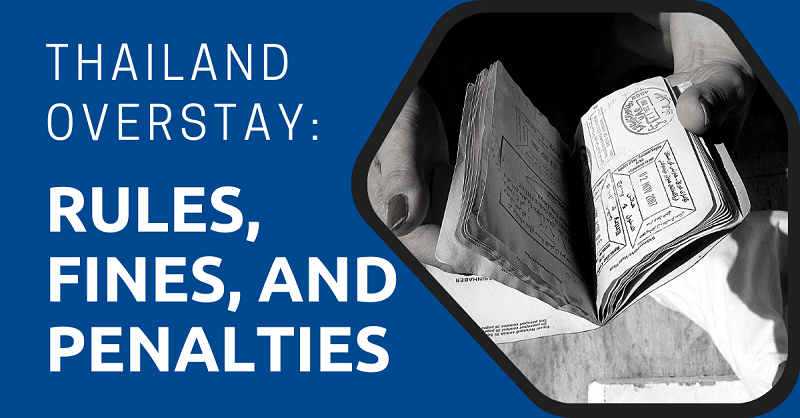
If you’re planning a trip to Thailand, it’s essential to be aware of the visa laws to avoid any penalties. Overstaying your visa in Thailand can be a serious offense that results in significant consequences, including fines, deportation, even imprisonment.
We’ve put together this guide to help you navigate Thailand’s visa rules and regulations to make sure you have a smooth trip.
"*" indicates required fields
Disclaimer: This article may include links to products or services offered by ExpatDen’s partners, which give us commissions when you click on them. Although this may influence how they appear in the text, we only recommend solutions that we would use in your situation. Read more in our Advertising Disclosure.
Contents
What Does it Mean to Overstay a Visa in Thailand?
Overstaying your visa refers to remaining in Thailand beyond the permitted duration of the visa, extension of stay (EoS) stamp, or visa exemption stamp. For the purpose of this article, we will refer to all of these things just as “visa”.
If you are coming to Thailand, you should take the time to know the difference between all the kinds of visas and stamps.
The length of stay allowed varies depending on the type of visa and the country of origin so you’ll need to keep track of your personal visa expiration date everytime you are issued a new visa to avoid overstaying.
For example, if you arrive in Thailand on March 1, 2023, on a 60-day tourist visa, you can stay in the country until April 30, 2023.
If you remain in Thailand beyond this date without renewing or extending your visa (getting an EoS stamp) or leaving and re-entering the country, you will be considered to have overstayed your visa.
What are the Penalties for Overstaying a Visa in Thailand?
Overstaying can have nasty consequences, like fines, ineligibility for future visas, deportation, blacklisting, even imprisonment.
Overstaying for even a day can result in penalties and a mark on your record and the consequences only increase with the length of your overstay.
Note that all of these penalties apply to you no matter what your visa status.
If you are on a visa exemption stamp (meaning you entered Thailand without applying for a visa in advance) or you have a tourist visa. The rules are the same. If you are on a student education visa or a digital nomad visa, all the punishments below are relevant to your case.
Fines
If you overstay your visa by any length of time, you will be subject to a 500 baht per day fine, up to a maximum of 20,000 baht.
This fine will need to be paid either at the airport before exiting the country or at the immigration office when you request an extension.
And trust us, there is no chance of them not noticing if you are late exiting Thailand, even by a few days or a few hours. The immigration staff at airports are very careful and will look at every stamp in your passport twice. Don’t even try to leave Thailand just after midnight on the day your visa expires. They will notice.
Future Visa Issues
Overstaying for any amount of time may also make you less eligible for Thai visas in the future and may make immigration officers more wary about granting entry or extensions.
For example, you might even have a problem getting the Thai Elite Visa, which is considered to be the easiest visa to get in Thailand (If you have the cash for it), if you have a history of overstay in Thailand.
Deportation, Imprisonment, & Ban
Consequences increase significantly if you overstay beyond the maximum 40-day fine period.
With this length of overstay, you may be subject to deportation and blacklisted from re-entering the country for a set number of years in addition to paying the maximum fine.
If you overstay by 90 days or more, you might be imprisoned for up to a year, in addition to deportation and a lifetime ban upon release on top of the 20k baht maximum fine and whatever legal fees you’ve acquired while trying to get out of detainment. Thai prison is not somewhere you want to end up.
Dealing with an Overstay
Overstaying a visa in Thailand is considered illegal and can result in detainment, fines, and being barred from re-entry.
If you realize that you have overstayed your visa, you must either plan to leave the country immediately or extend your visa.
If you don’t take immediate action once you realize you have overstayed your visa and you are caught by a police officer while overstaying (considered illegal even if it’s just by a few days) the process is more painful than if you were to have turned yourself in at an airport or immigration office.
You are likely to be brought to an immigration detainment center until they can process your fines and departure from the country.
If you choose to exit the country, be upfront with the immigration office that you are aware of the overstay and prepared to pay the 500 baht per day fine.
The other option is to head to your nearest Thai immigration office and ask for a visa extension. You will be subject to the overstay fine and either be issued an extension or denied and given a 7-day stamp to exit the country.
If you have overstayed for more than 90 days, it is advisable to seek legal help and inform your embassy of your now quite serious situation.
With this length of overstay, you will be detained at an immigration center when you turn yourself in either at the airport or an immigration office, be subject to the maximum 20,000 baht fine, and earn a lifetime ban from the kingdom upon release (after up to a year of detainment). Best avoided!
Learn More:
- The Complete Guide to Thailand Visas for US Citizens
- The Complete Guide to Thailand Visas for Australian Citizens
What Happens If I Overstay for One Day?
If you overstay in Thailand for one day or even for a few days, there won’t be any serious consequences.
You only need to pay fines at the airport and leave Thailand without any problem.
If you overstay in Thailand more than that, then you might have a problem when you want to come to Thailand again in the future.
However, if you get caught while overstaying, even if it’s a few days, you might be brought to the immigration detention center.
How to Monitor Your Visa Status
It’s crucial to keep track of your visa status while traveling in Thailand to avoid any unwanted complications. Fortunately, it’s easy to keep track of your visa status.
You can either check your passport’s last entry and exit dates from the last time you entered Thailand.
Or you can visit a Thai immigration office, where they can tell you the exact number of days remaining on your visa.
Applying for a Visa Extension
To extend your visa, you’ll need to apply at a Thai immigration office with supporting documentation before your current visa expires. Make sure you bring your passport, a completed visa extension form, and a passport photo.
The requirements used to also include your departure card but, at the time of writing, Thailand has stopped using arrival/departure cards (TM6), but keep an eye on this situation as it may change in the future.
Keep in mind that any fees required will be collected on the spot, and applications must be made in person. After the application is made, you may be issued an extension on the spot or denied and given a 7-day stamp within which you must leave the country.
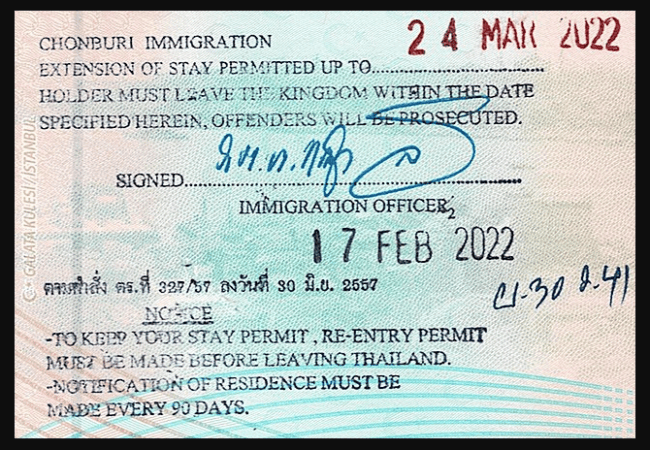
You can also attempt to extend your visa at an immigration office after you realize it has expired by up to a week. You will still need to pay a 500 baht per day fee but you may be granted a longer extension depending on your eligibility.
If you have overstayed your visa by longer than a week you should still report to an immigration office to pay the fines and get a 7-day exit extension.
Here’s some more details on how to extend your visa in Thailand.
Now, on to You
Overstaying your visa in Thailand can result in severe consequences like fines, imprisonment, even lifelong bans. You now know just how crucial it is to keep track of your visa expiration dates and take immediate action if you do overstay. We hope that by following these guidelines, you can enjoy your time in Thailand, worry-free!
Read more: Non-Immigrant Visas to Thailand: an In-Depth Guide


